#morality in literature
Explore tagged Tumblr posts
Text
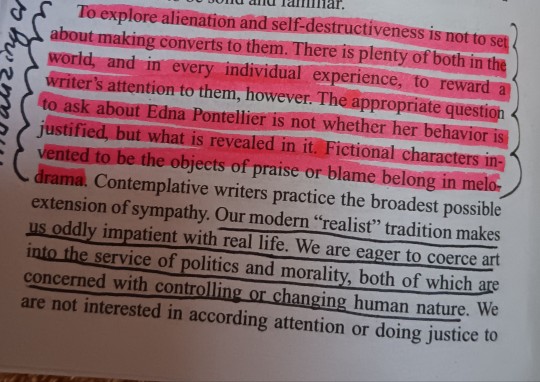
Reading the introduction of Kate Chopin's "The Awakening" by Marilynne Robinson, and, yeah....things really haven't changed since Robinson wrote this in the 80s
2 notes
·
View notes
Text
Tolstoy vs Dostoevsky: Which Russian Author Prevails?
If you had to choose between Tolstoy and Dostoevsky, which would it be? This is a question that has divided readers for centuries. For some, Tolstoy’s sweeping epics and keen insights into society’s inner workings reign supreme. For others, Dostoevsky’s psychological depth and exploration of the human soul have no equal. Choosing between them feels almost like choosing between two different…
#Classic Literature#Crime and Punishment#Dostoevsky#Literary Analysis#Morality in Literature#Russian Authors#Russian Literature#Tolstoy#war and Peace
1 note
·
View note
Text
The Intertwined Themes of Revenge and Morality in "Guild of Assassins"
As a writer, one of my primary goals is to create stories that not only entertain but also challenge readers to consider deeper questions about the human experience. In my upcoming dark fantasy novel, “Guild of Assassins,” I’ve woven a tapestry of themes that explore the complexities of vengeance, morality, and personal identity. At its core, “Guild of Assassins” is a story about the consuming…

View On WordPress
#assassin stories#Character Transformation#dark fantasy#dark fantasy themes#ethical dilemmas in fiction#fantasy character arcs#fantasy novels 2024#fantasy world-building#Guild of Assassins#identity exploration#moral ambiguity#moral choices in novels#morality in literature#narrative of vengeance#personal identity fiction#protagonist development#psychological fantasy#quest for justice#themes of revenge
1 note
·
View note
Text
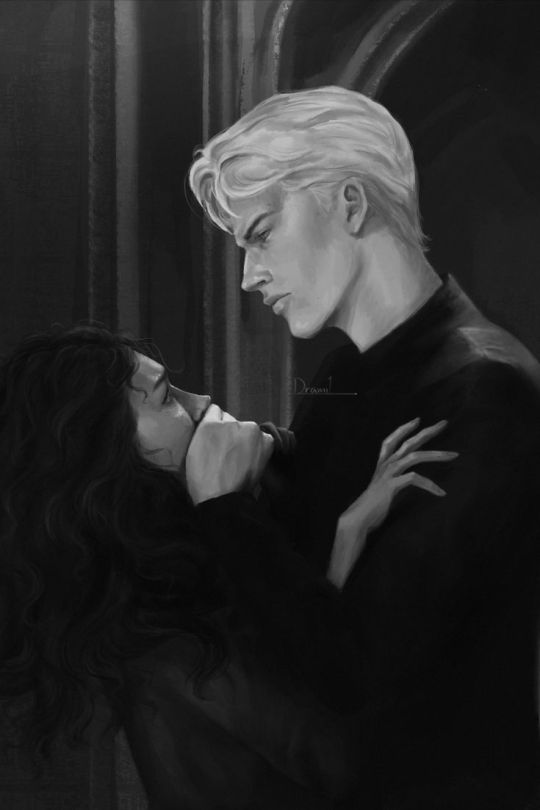
You were born bluer than a butterfly Beautiful and so deprived of oxygen Colder than your father's eyes He never learned to sympathize with anyone
I don't blame you But I can't change you Don't hate you But we can't save you
You were born reaching for your mother's hands Victim of your father's plans to rule the world Too afraid to step outside Paranoid and petrified of what you've heard
(But they could say the same 'bout me)
[Blue by Billie Eilish]
#dramione#draco malfoy#hermione granger#fanfiction#books and libraries#draco x hermione#fanfic#draco and hermione#hogwarts#books and literature#draco malfoy x hermione granger#love#i love him#romance secret#secret#romance#harry potter#billie eilish#blue#music#friends to lovers#enemies to friends#slow burn#secrets and masks#manacled#psychological trauma#morally gray Hermione Granger#morally gray Draco Malfoy#Death Eater Draco Malfoy
442 notes
·
View notes
Text
The Phantom of the Opera IS a love story btw. It's inherently a story about love. A lot of people still find it hard to accept it, probably because they're busy with their "I'm smarter than this beloved classic" Edgy Hot Take, this is why it's always important to remind.
It's a story about a man that, because he was abused and denied of love his entire life, he was forced to live with everything he knew about: survival.
It's a story about a man that craved so much for love, that he thought he could buy, or force it, throught talent and lies.
It's a story about compassion, redemption, and most importantly, love. Because Erik loved Christine. The ending is impactful because he loved her. His love for her didn't make him immune to be obsessive nor to hurt her. And if you don't believe Erik loved Christine, you're the one that misunderstood the relationships between these characters and why the story is the way it is in the first place.
#the phantom of the opera#erik#poto#gothic literature#gaston leroux#e/c#erik/christine#christine daaé#guys did you know that morally grey/villain character are capable of love#*gasp* what a surprise#this is what many adaptations like mazm and even the 1925 one missed
126 notes
·
View notes
Text
The great thing about C.S. Lewis’ Perelandra is how he defines stories. The villain, the Un-Man, when trying to explain to Alien Eve what a story is, basically says: “they’re what-ifs.” Whole alternate realities you make true by telling them to yourself. Stories.
But he’s the bad guy, and this philosophy of his is wrong, and it is being used to manipulate the Alien Eve into making a terrible mistake that cannot be undone. So it’s not a definition of stories, it’s a definition of the evil version, the wrong version, of stories.
Stories that serve the function of distracting from what is true, stories that rip your focus away from reality and help you play god in your head, start living like the story’s version of events is what’s true instead of the truth guiding your actions—those are evil. Those are the anti-stories just like the Un-man is the anti-what-mankind-is-supposed-to-be.
But C.S. Lewis is telling you this in a story. A story he’s writing himself. So therefore, stories can’t be all bad. This definition of a wrong story, a story that tries to reinvent reality, just means there must be a right kind of story. Right?
So what is it?
Well. What’s the opposite of the wrong kind of story? What’s the opposite of a story that is all about what-ifs and everything but reality?
A story that points back to reality.
That’s what C.S. Lewis’ does. That’s what Perelandra, the whole Ransom Trilogy, does. It’s not a story that is about an alternate reality. It’s an alternate reality story that is about reality. He used a green alien lady to make you think through the truth of the historical Eve, at the dawn of our time. In a new way. He used a story, not to say “what if?” but to say “because of.”
He just fooled your mind into going “what if” so that all along it would be led unresisting back to, “because of.” Not “what if reality was like this?” But “because of reality, what will you do?”
Evil stories can use the same superpower. “What if the world was like this? Ah, but you see, isn’t it?” Just like the Un-Man. “What if you were a tragic heroine, who shoulders the burden her foolish husband can’t? Ah, but you see, aren’t you? Couldn’t you be, if you just made this catastrophic decision?” When all along Ransom’s point is, “that’s not who you are, and that’s not who your husband is, so don’t bother imagining it or you’ll be convinced it’s true.”
Good stories point you back to reality, and they use the disguise of “what if” to point you when your own defenses might keep you from the truth.
Bad stories point you to anything other than reality, and try to convince you that anything other than reality is, in fact, reality.
#C.S. Lewis#Lewis#the ransom trilogy#the space trilogy#literature#perelandra#that hideous strength#Elwin ransom#Christianity#stories#storytelling philosophy#storytelling#writing#writing advice#morality#escapism
112 notes
·
View notes
Quote
...the one certain thing in life is that no one can make the truth untrue simply because it hurts.
David Weber, The Honor of the Queen
#quotes#David Weber#The Honor of the Queen#thepersonalwords#literature#life quotes#prose#lit#spilled ink#inspirational#inspirational-quotes#morality#philosophy#true#truth
95 notes
·
View notes
Text
Writing Notes: Morally Grey Characters

Morally grey characters - operate beyond the dichotomy of good versus evil.
These characters will usually make the choice to pursue their own ambitions over those of the greater good or evil.
Because their goals are removed from these qualities, they could be inherently good or bad, so long as they serve the character's ultimate purposes.
However, that’s not to say that morally grey characters don’t aim to make the world better (or worse) in some way.
They may have a larger goal that they’re striving to achieve.
Example: Immortality for all or taking down a corrupt government.
But this doesn’t necessarily mean morally grey characters won’t see others suffer, regardless of intent.
They are often described as being reserved and unfeeling—a dramatic outward expression for characters whose inner selves are anything but, yet appropriate to exemplify the secrets they keep locked away.
The beauty of morally grey characters is that they don't fit into a mold like many other character tropes, which makes them instantly feel more real.
Tips to Writing Morally Grey Characters
Your morally grey characters should still feel like a living, breathing person and not just a caricature of one. In order to realistically portray them, there are 4 important things to consider:
1. What is your morally grey character's life's mission?
This needs to become their guiding belief, their driving force.
These characters are very goal-oriented.
More than anything else, this is why they make the choices that they do, for better or worse.
2. How far are they willing to go to achieve their goals?
They are unique in that they are capable of making hard decisions that most of us might otherwise struggle with, and they often seem to do so with ease.
What matters is achieving their goals—not necessarily how they go about doing so.
3. They need to still have a system of core values to abide by.
Even morally grey characters have an internally consistent scale of, well, morality (albeit on their own terms).
Give your character a code to live by that even they wouldn’t break.
4. What is their role in your story?
Don’t create morally grey characters just for the sake of it.
Whether their storyline is part of the main plot, or whether they have subplots that influence the overall story, there needs to be a point to it all regardless.
Morally Grey Character or Villain?
What may differentiate a morally grey character from a true villain are the following 3 things.
Recognition: Your morally grey character should recognize that their choices can cause harm, intentionally or otherwise.
Remorse: Following that recognition, and often as a result of it, they must understand and experience remorse.
Redemption: Finally, when even they feel things have gone too far, your morally grey character must seek redemption however that manifests itself in your story.
Source ⚜ Writing Notes & References
#writing notes#on writing#morally gray characters#character development#writeblr#spilled ink#dark academia#writing reference#writing prompt#writers on tumblr#literature#poetry#poets on tumblr#writing tips#writing advice#fiction#creative writing#writing inspiration#writing inspo#writing ideas#picasso#art#writing resources
276 notes
·
View notes
Text
"I want to be good. I can't bear the thought of my soul being hideous."
- Oscar Wilde
#poets cafe#life#poems on tumblr#poetsclub#poem#poets on tumblr#poetry#poets corner#oscar wilde#Oscar#wilde#good#moral#morality#soul#spilled#spilled heart#spilled writing#spilled poetry#words#spilled thoughts#spilled words#spilled ink#Moral#morals#ethics#sociology#Quotes#poems and quotes#literature
86 notes
·
View notes
Text
Highly recommend the 1872 novella Carmilla to all the wlw iwtv fans out there, it's about a gothic lesbian vampire-human romance and it lowkey changed my life. Like I cannot explain to you how shockingly gay and poetic this story that came out two decades before Dracula is. I'm a little devastated it took me this long to read it tbh
(And if you're looking for a good retelling that embraces the gay further I recommend Carmilla and Laura by S.D. Simper. It's not as poetic but it focuses on internalized homophobia, religion and has a happier ending)
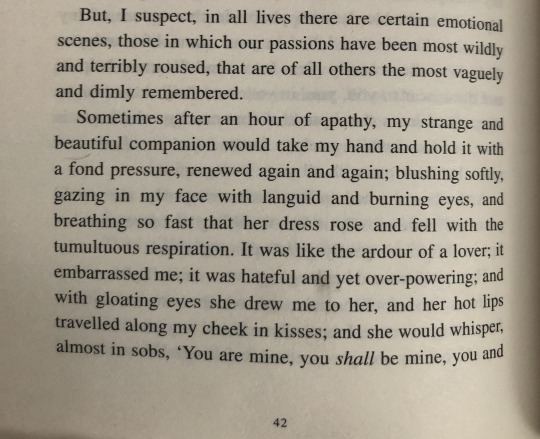
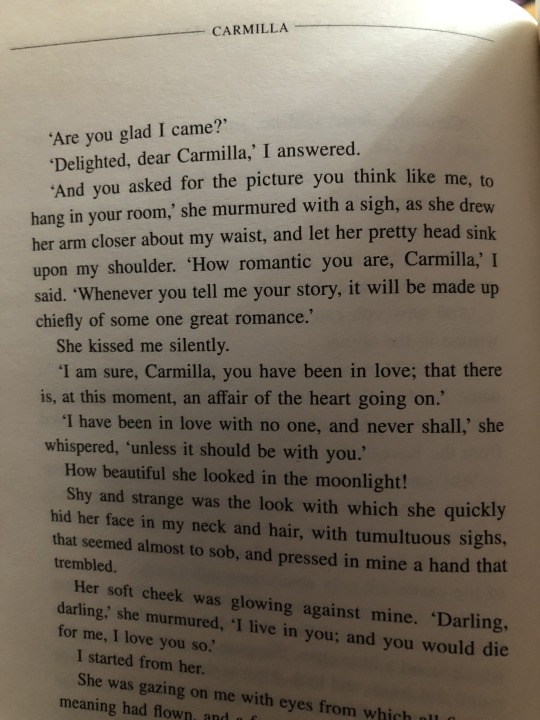
#carmilla#interview with the vampire#vampires#wlw#sapphic literature#theyre so gay#to like an INSANE degree for 1872#this book also came out before Dracula#its that og vampire shit#I could listen to Carmilla wax poetic about Laura all day#literature#iwtv#vampire chronicles#Where the hell is MY morally grey vampire gf#who stands over my bed covered in blood#I am in denial about the ending#carmilla karnstein#vampcore#lgbtq#queer books
421 notes
·
View notes
Quote
Existence is Identity, Consciousness is Identification.
Ayn Rand, Atlas Shrugged
#Ayn Rand#Atlas Shrugged#quotelr#quotes#literature#lit#atlas-shrugged#consciousness#existence#john-galt#life#man#mind#morality#morals#objectivism#philosophy#pursuit-of-happiness#rational#reason#think#thinking#truth#values#virtue#wisdom
127 notes
·
View notes
Text
I love the caption on my shirt.
Who agrees to that.
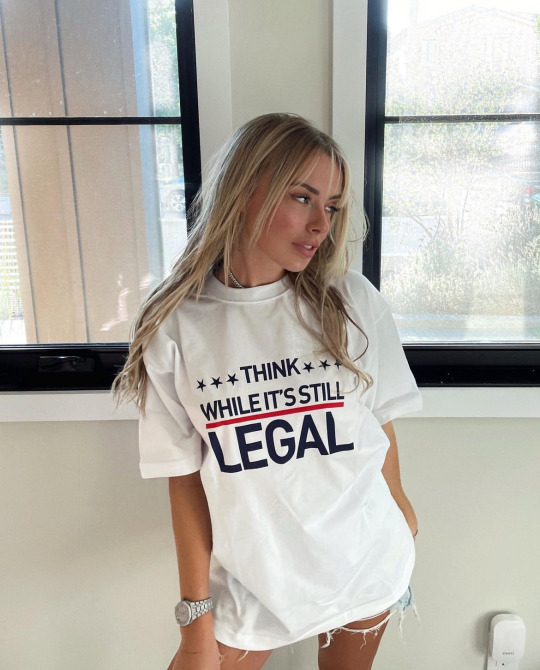
#lovers#beautiful#quotes#self love#cute#fall season#romance#unknown#fashion history#autumn#quotes and words#beautiful words#morals#deep thoughts#great minds think alike#english literature#literature#lit#original poem#amazing beauty#absolutely fabulous#truth#thru the mirror#spilled ink#literally me#just saying#best#memes#tumblr memes#me me me
76 notes
·
View notes
Text




"And we will be like the dancing nymphs in Botticelli's paintings." - The Priest and Archdeacon
#big - she is like a cat in the dark and then she is the darkness - vibes with patrick#which is interesting because while patrick is dressed as venus in this 16th century play he's hosting at his home#he is secretly a devotee to Freya and practices magic in her name#Patrick is one of my favorite characters - because he is really morally ambigious and despite being an archdeacon and eventually becoming#a bishop he is literally a whole witch on the side in secret - he loves that for himself - he also does spells for people and they won't#tell because he has a track record of cursing people#writers on tumblr#writers of tumblr#web weave#spilled ink#creative writing#poetry#writing community#writeblr#web weaving#typography#love quotes#love poem#dark academia#academia#queer characters#queer romance#original poetry#literature#literary quotes#my writing#painting
33 notes
·
View notes
Text


C.S. Lewis on temperance and virtue, from Mere Christianity.
47 notes
·
View notes
Quote
If any morality or ethics does not include kindness as their fundamental ingredient, then they are just an absurdity.
Debasish Mridha
#quotes#Debasish Mridha#thepersonalwords#literature#life quotes#prose#lit#spilled ink#debasish-mridha#debasish-mridha-md#ethics#inspirational#kindness#morality#philosophy#what-are-ethics-and-morality
63 notes
·
View notes
Text
Writing Notes: Moral Development

The cultural-developmental approach to moral psychology suggests 3 vital trajectories in moral development stages (Jensen, 2015):
Autonomy - Emphasizing individuality; focusing on the self, including self-interest, rights, and wellbeing
Community - Focusing on memberships and relationships within social groups, including duties to others and their welfare and adherence to group norms and customs
Divinity - Focusing on the spiritual or religious dimensions or moral reasoning, including the sacredness of moral codes
Together, they form an important framework for understanding how we reason about moral issues from various perspectives. They balance personal, social, and spiritual values while emphasizing purity, sanctity, and spiritual accountability (Jensen, 2015).
Moral development and behavior involve putting ourselves in the place of others and typically require a combination of mutual respect, empathy, and caring (Gibbs, 2019).
Moral judgment begins to form in the early years, taking place in a social context, driven by interactions with peers and adults involving “taking turns, sharing, harming, and responding to harm” (Haidt, 2001, p. 817).
Kohlberg’s Stages of Moral Development
Lawrence Kohlberg’s (2015) theory of stages of moral development has dominated research in moral development for several decades (Gross, 2020).
Kohlberg assessed individuals’ moral reasoning through the lens of moral dilemmas.
Subjects were asked to choose between two or more alternative reactions or responses.
Kohlberg (2015) suggests 6 qualitatively different stages of moral development across the following 3 levels of moral reasoning (Gross, 2020):
Level 1: Preconventional morality
External consequences shape moral reasoning.
Stage 1 (punishment and obedience orientation) – What is punishable determines what’s right and wrong. As such, being moral means avoiding punishment.
Stage 2 (instrumental relativist orientation) – What people want and are rewarded for determines right and wrong. Other people’s needs matter, but only in a reciprocal sense.
Level 2: Conventional morality
Moral reasoning is influenced by our strong need to adhere to rules and authority.
Stage 3 (interpersonal concordance or “good boy-nice girl” orientation) – Being moral is determined by what pleases and helps other people — and ultimately what the majority thinks.
Stage 4 (maintaining the social order orientation) – It is our duty to respect authority and maintain social order. As such, this is more important than the needs of our family and loved ones.
Level 3: Post-conventional morality
Moral reasoning is determined by abstract reasoning.
Stage 5 (social contract–legalistic orientation) – While laws are established based on mutual agreement, they can be changed democratically or, at times, overridden. Life is more sacred than the legal principle.
Stage 6 (universal ethical principles orientation) – As society’s rules are arbitrary, our own conscience is the ultimate judge of what is right and wrong. As such, they can be broken when they conflict with “universal” principles.
The Methodology
The now famous Heinz dilemma created by Kohlberg involves an imaginary scenario where a man called Heinz can only save the life of his wife dying from cancer by getting his hands on a drug sold by a local, greedy pharmacist (Gross, 2020).
Despite all attempts, the husband can’t get all the money needed to buy the drug, so he considers breaking into the pharmacy to save his wife’s life.
Having explained the dilemma to study participants, Kohlberg asked them a series of questions, including (Gross, 2020):
Should the husband steal the drug? Why or why not?
If he doesn’t steal the drug, does he truly love his wife? What should he do then?
What if the person dying wasn’t his wife, but a stranger? What should he do?
How important is it for people to do all they can for the life of another?
Should people do everything they can to obey the law?
Criticism of Kohlberg’s Theory
Researchers have identified and expressed several criticisms of Kohlberg’s theory and stages of moral development (Gross, 2020; Gibbs, 2019).
Young children’s understanding of moral regulation is more complex than Kohlberg’s stage 1 (typically seen as 9 years old and below), which relies upon punishment and obedience.
Children do not typically experience the issues raised by Kohlberg’s dilemmas during their moral development. In fact, while their reasoning can be highly complex, it is often unclear and messy.
Some theorists argue that, as Kohlberg relied on an all-male sample in his research, the theory and stages described are biased toward men. As such, there are conflicting views regarding the suggestion that boys are biased toward preferring a “justice orientation” rather than a “care orientation” (with girls showing the opposite), as when pressed, they can switch between the two.
Education is a frequently ignored and confounding factor. While college-educated individuals are not morally superior, they may be more verbally sophisticated, influencing the moral stages to which they are attributed.
Source ⚜ More: Writing Notes & References ⚜ Writing Resources PDFs
#moral development#psychology#writing reference#writeblr#dark academia#character development#spilled ink#literature#writing tips#writing prompt#creative writing#fiction#writers on tumblr#writing advice#story#novel#light academia#writing inspiration#writing ideas#mary cassatt#writing resources
93 notes
·
View notes